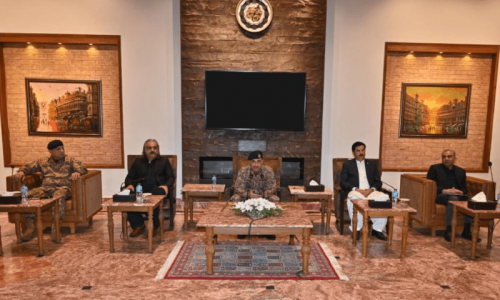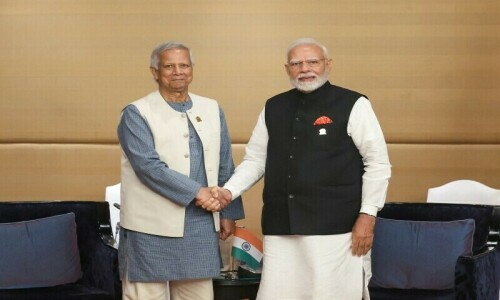LAHORE: Chief of his own faction of the JUI, Maulana Fazlur Rehman, said on Wednesday that the state had “completely lost its writ” in Khyber Pakhtunkhwa and Balochistan, and people have been migrating from there for two decades after losing their livelihoods.
Speaking to reporters, he appealed to “all stakeholders to find a solution before it is too late”.
The Maulana said that war-torn areas, where the government loses its writ, always face geographical challenges. “We are sitting on scorched soil, and all stakeholders must find a solution before it is too late.”
The most tragic part of this sordid affair that Punjab and other parts of the country are not realising the gravity of the situation, he said. “Such areas run the risk of change in geography, become an invitation to interference by outsiders, especially when these areas are blessed with mines and minerals of precious nature.
“It is time for the entire country to realise the potential threats coming from these areas.”
The JUI-F chief said that instead of debating the consequences of Trump’s inauguration on the world scene, the stakeholders better concentrate on own problems.
“If we are not ready to accept supremacy of one institution in the country, how can we accept dictations from a foreign president?” Referring to the state of democracy in Pakistan, he said the establishment always interferes in national politics to keep its grip firm.
Citing the example of the JUI-F and government negotiations in the run-up to the 26th Amendment, Maulana Fazl claimed that the party negotiated on stated principles and won. “If a single party can negotiate its deal without compromising on principles, why cannot others do? Especially if they join hands and take a joint and principled stand? It’s a question the media should also ponder,” he advised.
On Pak-Afghan tensions and its solution, Maulana Fazl advised “rational realism” and said, “Such frictions between neighbours are not unusual. However, Pakistan needs to take stock of things in a calm and cool manner. If it continues behaving emotionally, it won’t end up anywhere. I visited Afghanistan before [general] elections, finalised many things with the Afghans, conveyed it to those making decisions on our side and asked them to create mechanisms for cooperation.”
“However, the JUI-F was put on the chopping block in elections, depriving it of its due share in Khyber Pakhtunkhwa and Balochistan. How can we achieve common goals when we continue behaving like we do? Until and unless we restore confidence in each other by behaving transparently and sincerely, things would become harder for everyone,” he said.
Published in Dawn, January 16th, 2025














































